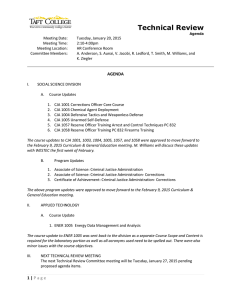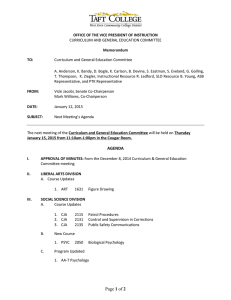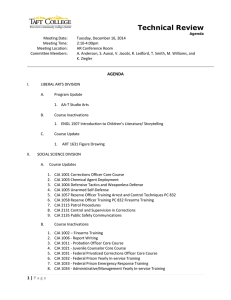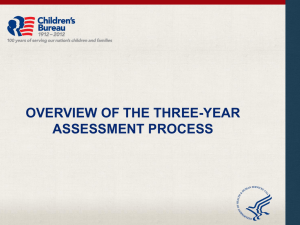Department of
advertisement
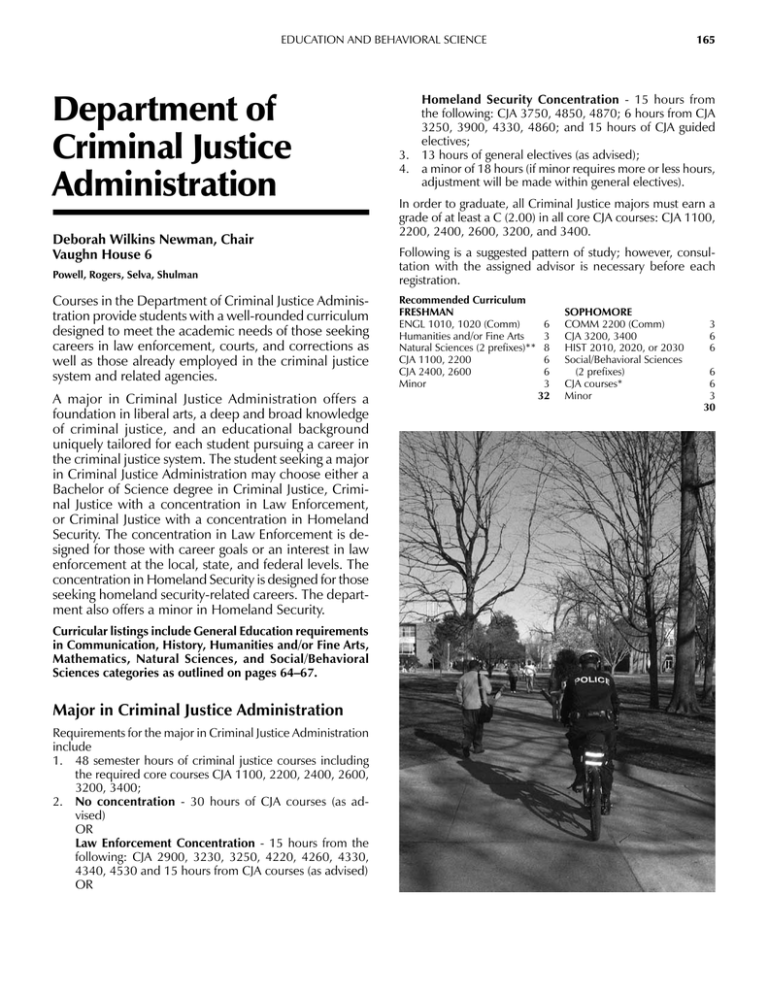
EDUCATION AND BEHAVIORAL SCIENCE Department of Criminal Justice Administration Deborah Wilkins Newman, Chair Vaughn House 6 Powell, Rogers, Selva, Shulman Courses in the Department of Criminal Justice Adminis­ tration provide students with a well-rounded curriculum designed to meet the academic needs of those seeking careers in law enforcement, courts, and corrections as well as those already employed in the criminal justice system and related agencies. A major in Criminal Justice Administration offers a foundation in liberal arts, a deep and broad knowledge of criminal justice, and an educational background uniquely tailored for each student pursuing a career in the criminal justice system. The student seeking a major in Criminal Justice Administration may choose either a Bachelor of Science degree in Criminal Justice, Crimi­ nal Justice with a concentration in Law Enforcement, or Criminal Justice with a concentration in Homeland Security. The concentration in Law Enforcement is de­ signed for those with career goals or an interest in law enforcement at the local, state, and federal levels. The concentration in Homeland Security is designed for those seeking homeland security-related careers. The depart­ ment also offers a minor in Homeland Security. Curricular listings include General Education requirements in Communication, History, Humanities and/or Fine Arts, Mathematics, Natural Sciences, and Social/Behavioral Sciences categories as outlined on pages 64–67. Major in Criminal Justice Administration Requirements for the major in Criminal Justice Adminis­tration include 1. 48 semester hours of criminal justice courses includ­ing the required core courses CJA 1100, 2200, 2400, 2600, 3200, 3400; 2. No concentration - 30 hours of CJA courses (as ad­ vised) OR Law Enforcement Concentration - 15 hours from the following: CJA 2900, 3230, 3250, 4220, 4260, 4330, 4340, 4530 and 15 hours from CJA courses (as advised) OR Criminal Justice Administration 165 Homeland Security Concentration - 15 hours from the following: CJA 3750, 4850, 4870; 6 hours from CJA 3250, 3900, 4330, 4860; and 15 hours of CJA guided electives; 3. 13 hours of general electives (as advised); 4. a minor of 18 hours (if minor requires more or less hours, adjustment will be made within general electives). In order to graduate, all Criminal Justice majors must earn a grade of at least a C (2.00) in all core CJA courses: CJA 1100, 2200, 2400, 2600, 3200, and 3400. Following is a suggested pattern of study; however, consul­ tation with the assigned advisor is necessary before each registration. Recommended Curriculum FRESHMAN SOPHOMORE ENGL 1010, 1020 (Comm) 6 COMM 2200 (Comm) 3 CJA 3200, 3400 Humanities and/or Fine Arts Natural Sciences (2 prefixes)** 8 HIST 2010, 2020, or 2030 CJA 1100, 2200 6 Social/Behavioral Sciences CJA 2400, 2600 6 (2 prefixes) Minor 3 CJA courses* 32 Minor 3 6 6 6 6 3 30 166 Criminal Justice Administration EDUCATION AND BEHAVIORAL SCIENCE JUNIOR SENIOR ENGL 2020 or 2030 or CJA courses HUM 2610 (Hum/FA) 3 Minor 3 General electives Mathematics Humanities and/or Fine Arts 3 CJA courses 15 6 Minor 30 9 6 13 28 *CJA major with Law Enforcement or Homeland Security concentration must fulfill the 15-hour requirement **PSCI 1030/1031 for CJA majors recommended Minor in Criminal Justice Administration A minor in Criminal Justice Administration requires 18 se­ mester hours including CJA 1100, 2200, and 2400 or 2600 plus 9 hours of criminal justice upper-division electives. CJA 4300 may not be used for the 9 hours of electives, but may be taken by minors. Minor in Homeland Security The minor in Homeland Security provides the complementary knowledge and educational foundation for students seeking careers in their uniquely chosen majors with homeland se­ curity concerns. Topics include the operation of the criminal justice system, the methods and effects of terrorism, the means of providing security against terrorist acts in public and private businesses and industries, and the legal treatment of terror­ ist acts including detection, investigation, prosecution, and constitutional issues. Only non-Criminal Justice Administration majors may minor in Homeland Security. The minor requires 18 hours of CJA courses including 12 hours of required courses and 6 hours of guided electives. Required Courses (9 hours): CJA 1100 Introduction to Criminal Justice Administration CJA 3750 Terrorism and Criminal Justice CJA 4850 Private and Industrial Security One of the following (3 hours): CJA 4860 Security Administration CJA 4870 Security Law Guided Electives (6 hours); CJA 3250 Criminal Law CJA 3400 Constitutional Issues and Criminal Justice CJA 3900 Organized and White Collar Crime CJA 4330 Criminal Investigation Courses in Criminal Justice Administration [CJA] See back of catalog for course descriptions. Graduate Study Requirements for the Master of Criminal Justice degree offered in conjunction with TSU and a list of the courses offered for graduate credit are pub­lished in the Graduate Catalog.
